When it comes to preserving the shine of diamonds and cleaning them effectively, it’s important to know the proper methods that avoid damaging the precious stones.
One common question that arises is whether vinegar can harm diamonds. The answer is as follows:
While vinegar can be effective in cleaning diamond rings, it is slightly acidic and should be used with caution, especially on more porous stones. To create a cleaning solution, you can combine two teaspoons of baking soda with 1/2 cup of white vinegar.
Now, let’s explore the topic in more detail by understanding the nature of diamonds, the properties of vinegar, and how they interact. We will discuss various considerations for and against using vinegar, as well as explore alternative methods for cleaning diamonds. Let’s delve into it!
DESIGN YOUR OWN ENGAGEMENT RING: START WITH A SETTING OR START WITH A DIAMOND. IT’S REALLY UP TO YOU!
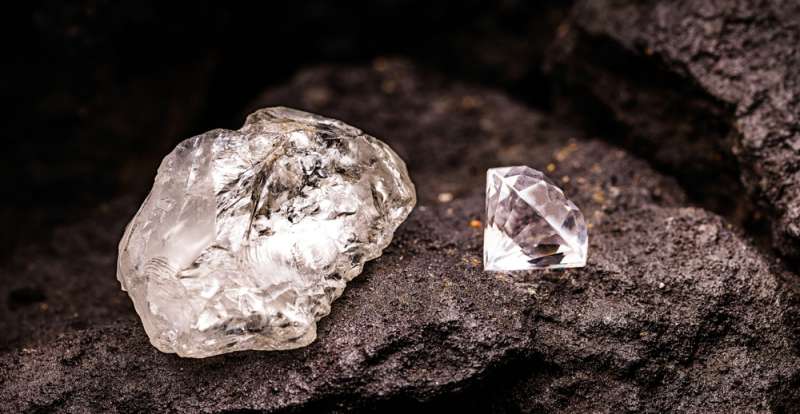
What Are Diamonds, How They Are Formed, and What Are They Made Of?
Diamonds are formed from carbon atoms arranged in a unique crystal structure known as the diamond cubic crystal structure. While graphite is another form of carbon, diamonds stand out due to their exceptional hardness, unmatched brilliance, and significant emotional value.
Interestingly, despite being composed mostly of carbon atoms, diamonds are the only substance capable of scratching their own surface. They originate from carbon atoms that bond together under extreme conditions of pressure and heat, found deep within the Earth’s carbon reserves approximately 90 to 125 miles below the surface.
The formation of diamonds can take millions of years or occur relatively quickly within days or months. Their sizes are measured in millimeters (mm), which correspond to their carat weight. For example, a 1-carat round diamond typically has a diameter of 6.5 mm, while a 1.25-carat diamond measures around 6.8 mm in diameter. Square-cut diamonds, such as princess or cushion cuts, have different dimensions, with a 1-carat square-cut diamond measuring about 5.5 mm and a 1.25-carat diamond measuring around 6 mm.
Diamond production is gradually decreasing as mines approach the end of their productive life. The cost of diamonds is influenced by various factors, including high marketing expenses, limited availability of exceptional-grade stones, and significant demand.
Now that we have explored diamonds, their sizes, shapes, and qualities, it’s time to address our initial question. Let’s proceed to the next part of our discussion!
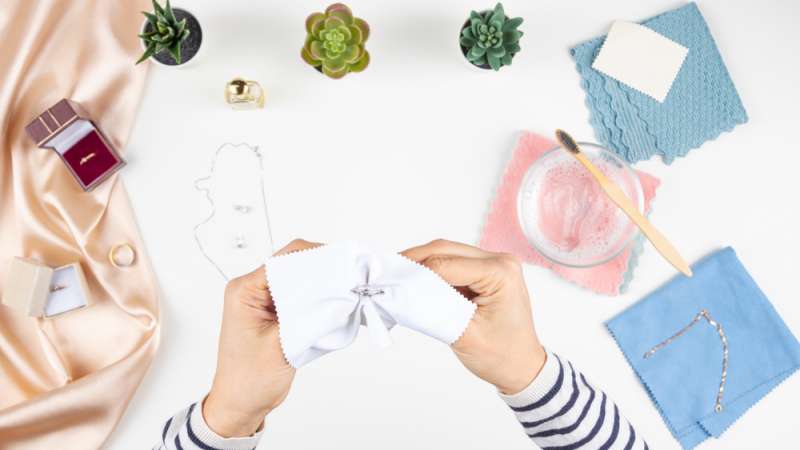
Will Vinegar Harm A Diamond? – A Decisive Answer
To address our next question, let’s explore what vinegar is and its composition.
Vinegar is an aqueous solution formed by combining acetic acid and trace chemicals, such as flavorings. Typically, acetic acid makes up around 5-8 percent of the volume of vinegar. It is commonly used in cooking to add flavor directly to food or as an ingredient in condiments like mustard, ketchup, and mayonnaise. Vinegar is also utilized in the process of pickling.
Various fruits and plants can be used to produce vinegar, including apples, barley, coconuts, dates, grapes, kiwis, and sugarcane. Additionally, substances like malted barley, oats, and industrial alcohol can be used to create vinegar, such as distilled white vinegar. The fermentation of diluted alcoholic liquids produces vinegar, which contains acetic acid and imparts a sour taste.
White vinegar, for example, typically consists of 93–96% water and 4–7% acetic acid. It has multiple applications, including cooking, baking, cleaning, weed management, and potential health benefits such as aiding weight reduction, lowering cholesterol, and regulating blood sugar levels.
Now let’s address the question at hand: Can vinegar be used to clean a diamond ring?
As mentioned before, vinegar can indeed work wonders on your diamond ring, but it is slightly acidic and should be used cautiously on more porous stones.
To utilize vinegar for cleaning, you can combine two teaspoons of baking soda with 1/2 cup of white vinegar. This mixture can be effective in cleaning diamond rings and can also be used for silver diamond rings.
For cleaning, dissolve one cup of white vinegar with four teaspoons of baking soda. Allow your ring to soak in this solution for approximately 2.5 hours, then rinse it in cold water and pat it dry with a towel.
Furthermore, if you have a solid gold engagement ring, you can restore its brilliance by blotting it with beer using a cotton towel and gently rubbing.
While there are expensive jewelry cleaners available, vinegar proves to be a versatile substance that can serve as a jewelry cleaner and seasoning agent. However, it is important to note that vinegar should not be used to clean pearls, gold, or gemstones, as it can potentially damage them. In such cases, it is best to follow specific instructions for cleaning those particular jewelry pieces.
To provide a clear procedure for cleaning diamonds with vinegar, we have outlined five steps for your convenience. Let’s delve into them now!
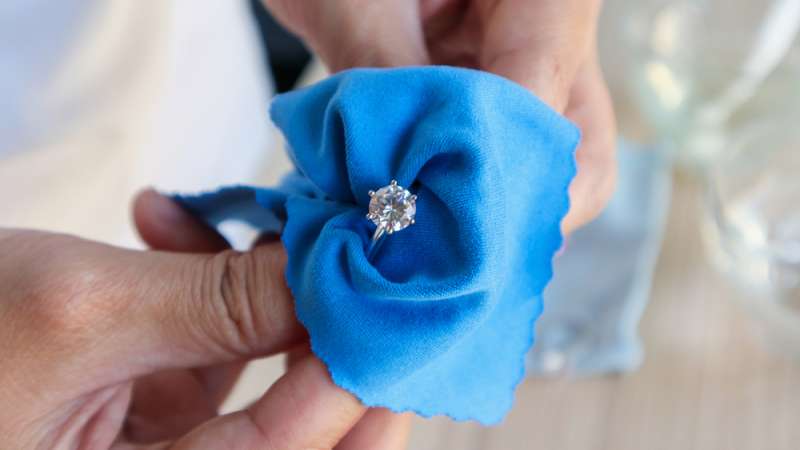
Diamond Cleaning With Vinegar: 5 steps
Step 1: Combine 1/4 cup vinegar and 1 cup of distilled water in a dish, ensuring they are well mixed.
Step 2: Submerge your diamond jewelry in the solution for approximately 15 minutes.
Step 3: If the diamond is still dirty, gently scrub off any dirt using a toothbrush.
Step 4: Rinse the diamond under running water to remove any remaining residue.
Step 5: Use a soft towel to dry the diamond jewelry thoroughly.
By following these five steps, your diamond should now look as good as new.
Remember: Diamonds are precious and valuable, so they should be treasured. When they become dirty, cleaning them with vinegar can help restore their sparkle. Make sure to take proper care of your diamonds to keep them shining for a long time.
Now, let’s address the question of whether vinegar can harm diamond jewelry.
While vinegar is often used for cleaning diamonds, it’s important to use it correctly to avoid any potential damage to your jewelry.
This leads us to the next question: What is the best substance to use when cleaning diamonds?
A mixture of ammonia or mild dish detergent with water is considered the best cleaning solution for diamonds. Combine one cup of lukewarm water with one-fourth cup of ammonia in the solution.
After preparing the mixture, simply place your diamond jewelry in it and let it soak for 20 to 30 minutes.
It’s a simple and effective method for cleaning diamonds!
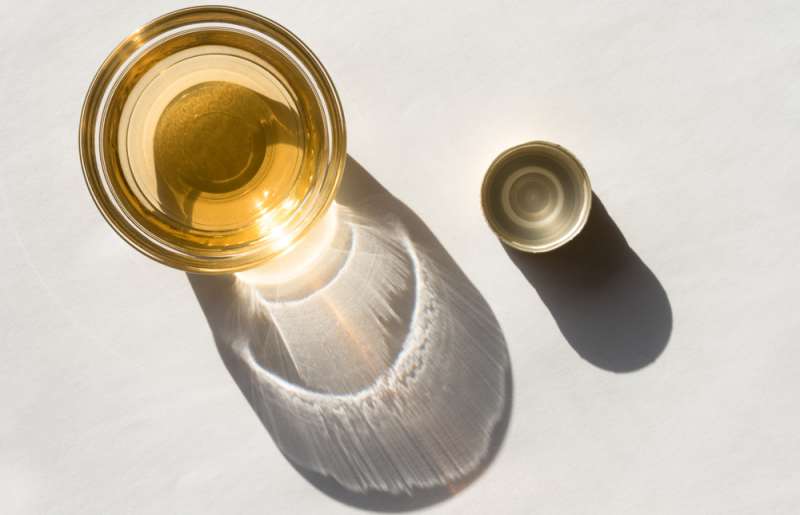
Can White Wine Vinegar Be Used To Clean Instead Of Ordinary Vinegar?
White wine vinegar can indeed be used as a cleaning agent, but it may be more expensive compared to white distilled vinegar, making it a less cost-effective option.
It’s important to note that white vinegar and white wine vinegar are not interchangeable because they have distinct flavors. They cannot be substituted for one another in cleaning, canning, or any other application.
While the production methods for white vinegar and white wine vinegar differ, it’s the constituents that matter the most. White vinegar is made from grain alcohol, similar to vodka, and any alcohol present in the vinegar is removed during the production process. On the other hand, white wine vinegar is made from white wine instead of grain alcohol.
When it comes to cleaning diamonds, there are various methods and cleaning agents you can use, including vinegar. However, it’s essential to be cautious because vinegar can potentially damage certain types of jewelry, such as gold, gemstones, pearls, and plated jewelry.
Our recommendation is to exercise caution when using vinegar or other mild acidic substances, such as witch hazel, as they may not be suitable for soft or porous stones or plated jewelry. Additionally, abrasive substances like baking soda can potentially cause damage to metals and softer stones.
It’s always a good idea to consult with a professional jeweler or follow specific cleaning instructions provided by the manufacturer to ensure the safety and proper care of your jewelry.
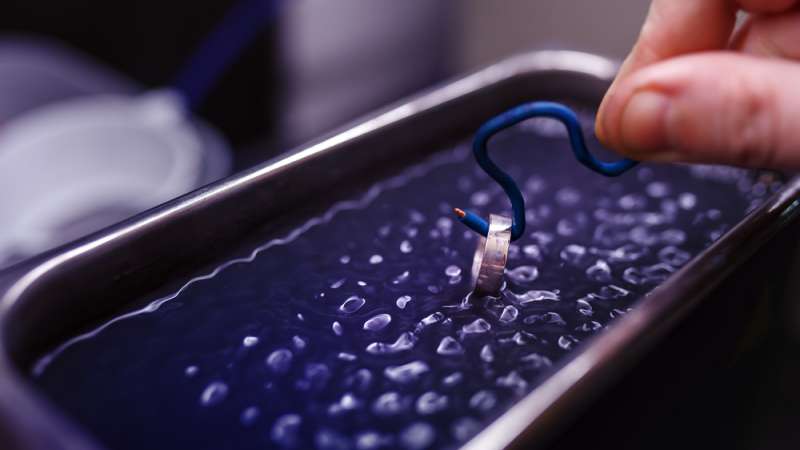
What Should You Avoid Cleaning A Diamond Ring With?
Here are the top five items you should avoid using to clean a diamond ring:
- Sanitizers: Cleaning supplies and sanitizers with chemicals can potentially harm your diamond ring and make the cleaning process more difficult. It’s best to steer clear of them.
- Paper: Avoid using paper towels as they can cause damage to the metal of your diamond ring. If you don’t have a cotton towel, it’s preferable to let the ring dry on a clean surface after wet cleaning.
- Sonic Cleaners for Jewelry: While ultrasonic cleaners can provide a quick sparkle to your diamond, they can also be risky. These cleaners may cause the diamond ring to become loose or even fall out of the machine, so it’s best to avoid them.
- Harsh Brush: When cleaning your diamond ring, use the softest toothbrush available to prevent scratching the stone. A gentle touch is crucial to maintain its shine and integrity.
- Household Cleaners: Using household cleansers on a diamond ring is not recommended, especially if they contain acetone, bleach, or chlorine. These substances can be harmful to the ring, so it’s better to avoid them altogether.
Now, let’s discuss how frequently a diamond ring should be cleaned.
The frequency of cleaning a diamond ring depends on the level of dirt and impurities it accumulates. For mild impurities, it’s advisable to clean the ring at least once a week.
For deeper cleaning and treatment of stubborn debris, it’s recommended to take your diamond ring to a qualified jeweler at least twice a year.
If you lead an active lifestyle involving activities like cooking, gardening, sports, spending time outdoors, or reside in an area with poor air quality, you may need more frequent cleaning.
Lastly, for special occasions like a wedding anniversary or a birthday celebration, combining home cleaning with a visit to a reputable jeweler is a wise choice to ensure your diamond ring looks its best.
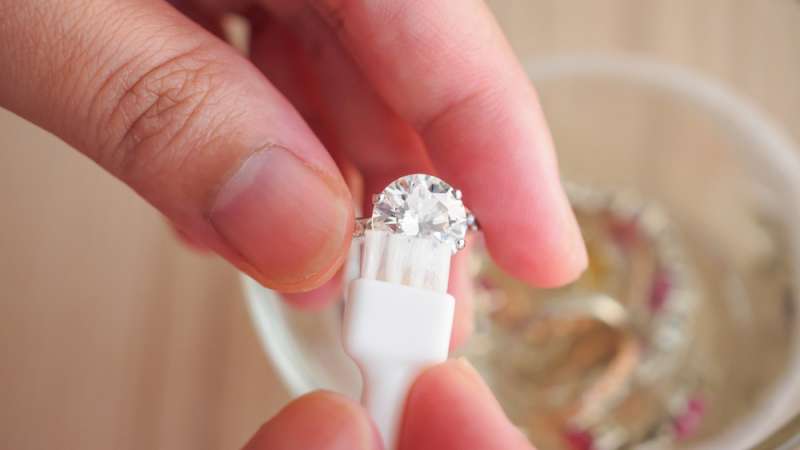
How Can I Remove Dirt And Damage From A Diamond Ring?
Cleaning a diamond ring at home is a great idea, but it’s important to take precautions to protect the jewelry from damage and deterioration. Follow these tips to maintain the shine and purity of your diamond ring and reduce the need for frequent cleaning:
- Remove your wedding band before engaging in physical activities. Exercise can exert additional strain on the delicate metal of the diamond ring, so it’s best to take it off during workouts.
- Avoid wearing your diamond ring during activities that involve bending, such as playing sports like soccer, basketball, volleyball, or tennis. This helps prevent unnecessary stress on the ring.
- It’s not advisable to wear your diamond ring at night or while applying daily skincare products. Lotions, moisturizers, hairsprays, and fragrances can dull the brilliance of the stone. Make sure to touch the ring with clean, dry hands to avoid transferring any cosmetic residue.
- When at home, it’s recommended to remove your diamond ring and store it safely. Put it back on only when you’re ready to leave. This reduces the exposure to potential damage or loss.
- Avoid wearing your diamond ring while swimming or taking a shower. Any type of water can be harmful to the ring. Showers pose a risk of the ring slipping off, and shampoos and shower gels can leave residues. Chlorine in pools can also damage metals like platinum and gold.
- Water and the ocean present a significant risk to your diamond ring due to the potential for loss. It’s best to avoid wearing it in such environments.
- Keep your diamond ring away from exposure to harsh chemicals and activities like cooking and cleaning. These can impact the ring’s integrity and damage its appearance.
- Be cautious about placing your diamond engagement ring in a position where it may come into contact with hard surfaces, as this can cause it to flex or chip.
Remember that microorganisms in food and harsh chemicals in household cleaning products can pose risks to your diamond ring, so it’s essential to handle it with care and take preventive measures.
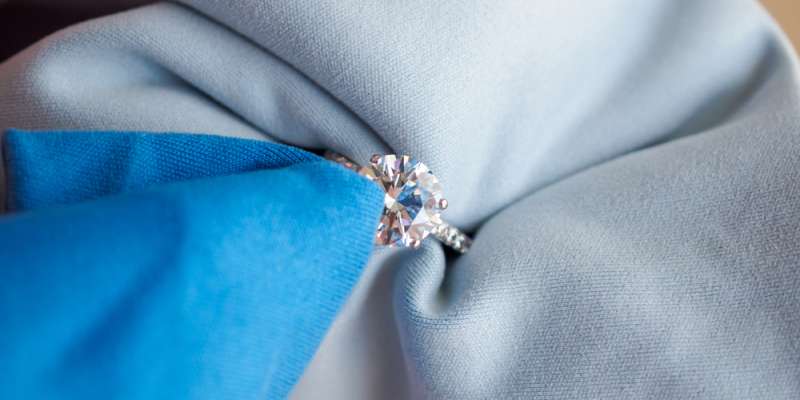
Final Thoughts
We believe we have sufficiently addressed the main question: Can vinegar harm a diamond?
In short, the answer is:
Yes, vinegar can be effective in cleaning your diamond ring, but due to its slight acidity, it should be used with caution on more porous stones. A mixture of 1/2 cup of white vinegar and two tablespoons of baking soda is recommended.
Throughout this post, we have strived to provide you with comprehensive information about diamonds, their characteristics, and various other aspects. Our intention was not only to educate but also to entertain you.
Furthermore, we have provided thorough guidance on how to properly clean your diamonds and highlighted what to avoid.
We hope that by reading this post, you have not only gained valuable knowledge but also had an enjoyable experience.


